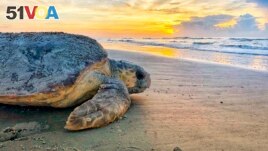10 May 2023
The U.S. Army Corps of Engineers has agreed to study the effects of its dredging operations on sea turtles in the state of Georgia. Dredging is the process of removing sand from waterways.
The agency announced its decision Friday. Shortly after, local non-profit group One Hundred Miles withdrew its legal action aimed at stopping dredging.
"The Corps has now committed to what we've asked for, to go back and review the science," Catherine Ridley, a vice president of the group, said Monday.

FILE - In this June 30, 2019, photo provided by the Georgia Department of Natural Resources, a loggerhead sea turtle returns to the ocean after nesting on Ossabaw Island, Ga. (Georgia Department of Natural Resources via AP, File)
She said the science shows that seasonal dredging puts sea turtles at risk. And, she said, it threatens many years of progress in environmental protection in Georgia.
The now withdrawn legal action began in December of 2022. However, environmentalists have been fighting against dredging since 2021. That year, the Corps announced it would end a policy limiting dredging in shipping areas during nesting season for sea turtles. The seasonal ban had been in place since 1991.
The powerful pumps necessary to remove the sand are dangerous. They can hurt and kill the animals. Many female turtles spend the warmer months in areas where the dredging takes place. So the 1991 order ended dredging during those months.
Conservationists credit that policy with helping the sea turtle population to recover and grow its numbers.
The U.S. Army Corps of Engineers is responsible for keeping shipping waterways clear. It said in a statement, that a fuller study will ensure the public, government and all interested who are involved in the examination. It also said investigators will look at all possible effects of dredging on humans and nature.
Since the 1990s, dredging in Georgia and in the states of North and South Carolina, is done from about December to March. Federally protected giant loggerhead sea turtles usually start releasing their eggs in the area in May. Smaller numbers of endangered green and Kemp's ridley sea turtles do the same.
The Corps has argued that seasonal dredging limits are no longer necessary. It says sea turtle populations have recovered enough, noting a National Marine Fisheries Service report from 2020. The report said protected sea turtle populations could withstand the estimated 150 deaths expected from year-round dredging.
Army Corps officials also argued that the ban makes it hard for them to get contracts with companies in the industry. And the Corps says that dredging periods timed to protect sea turtles ignore the needs of other animals, like the endangered North Atlantic right whales. Those large ocean animals visit the same waters in the winter.
The Army Corps said it does not know how long it will take to complete the newly-announced wide study.
I'm Gregory Stachel.
Russ Bynum reported this story for The Associated Press. Gregory Stachel adapted it for VOA Learning English.
___________________________________________________________________
Words in This Story
commit – v. to say that (someone or something) will definitely do something